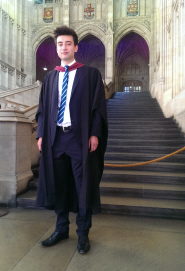Despite the practical and psychological struggles, Dan’s managed to remain positive and will cross the stage in the Wills Memorial Building on Monday [15 July] in front of his proud parents, friends and tutors.
He’s even managed to secure a 10 week internship at an investment bank in London and a job at the Financial Services Authority (FSA) awaits him at the end of the summer.
Dan’s identical twin brother Michael also lost his sight to Leber’s Optic Neuropathy, an extremely rare condition for which there is no known cause or cure.
He had been enjoying Freshers’ Week at Barts and The London School of Medicine in 2009 when his vision started to deteriorate. He transferred to a Geography degree at King’s College London, where he’s just achieved First class honours.
Dan said: “Our lives and hopes for the future changed beyond recognition. Our parents went from wanting us to be hugely successful to simply wanting us to be happy. Having both sons lose their sight must be every parent’s worst nightmare, so to turn it around and for us both to graduate and get jobs has filled them with confidence for the future.
“I was at the brink of quitting at the start of my third year but the last thing I wanted to do was sit at home with nothing to do, so I decided to complete my final year on a part-time basis. I’m so thankful that I didn’t give up.”
Michael lost his sight first and, because the pair are identical twins, Dan was told he had a 60 to 70 per cent chance of also going blind – a likelihood he describes as a “dark cloud” that hung over him during his first two years at the University of Bristol.
He had been preparing for his second year exams in 2011 when he began to struggle to see through his left eye. Within two weeks his near perfect vision started to rapidly deteriorate.
The twins now have just seven per cent of their sight left and can see shadows in their peripheral vision.
Dan said: “Getting used to life again and adjusting to a new way of learning was very difficult but made a whole lot easier by the extensive support network that has surrounded me at the University.
“The prospect of my personal goals and ambitions falling away from me due to not being able to see that well was a psychological blow. Graduating and finding a job are the first steps on a rehabilitation that will continue far into the future.”
The University has modified buildings on campus and bought various assistive technologies to allow Dan to work at full capacity, with additional helpers on hand for more practical challenges.
Leber’s Optic Neuropathy is the loss of vision as a result of the death of cells in the optic nerve, causing it to stop relaying vital information from the eyes to the brain.
Although it’s a hereditary condition, linked to a number of genes, the brothers have been unable to find any family history going back four generations.
Only 150 people in the UK are known to be affected by the condition, with around 95 per cent never returning to full-time education.
Not one to shy away from a challenge, Dan even cycled 570km from London to Amsterdam with Michael and their friends to raise over £17,000 for Blind in Business - a charity which helps blind and partially sighted people into work through their training and employment services.
